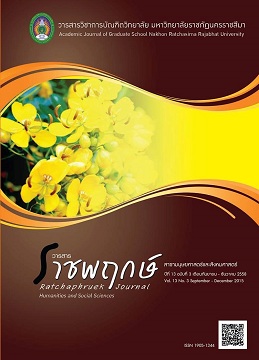ปัจจัยที่ส่งผลต่อพฤติกรรมการประหยัดพลังงานไฟฟ้า ของนักศึกษาสถาบันอุดมศึกษาเอกชน: ศึกษากรณี วิทยาลัยเซนต์หลุยส์
Main Article Content
Abstract
การวิจัยนี้เป็นการวิจัยแบบสำรวจมีวัตถุประสงค์คือ 1) เพื่อศึกษาปัจจัยที่ส่งผลต่อพฤติกรรมการประหยัดพลังงานไฟฟ้าของนักศึกษา 2) เพื่อศึกษาระดับพฤติกรรมการประหยัดพลังงานไฟฟ้าของนักศึกษา กลุ่มตัวอย่างเป็นนักศึกษาวิทยาลัยเซนต์หลุยส์ จำนวน 300 คน โดยการสุ่มแบบแบ่งชั้นที่มีสัดส่วนเท่ากัน สถิติที่ใช้ในการวิเคราะห์ข้อมูล ได้แก่ ค่าร้อยละ ค่าเฉลี่ย ค่าความเบี่ยงเบนมาตรฐาน และการวิเคราะห์การถดถอยแบบพหุคูณ
ผลการวิจัยพบว่า
1. ปัจจัยที่ส่งผลต่อพฤติกรรมการประหยัดพลังงานไฟฟ้าได้มากที่สุด คือ การตระหนักรู้บุญคุณธรรมชาติ มีค่าสัมประสิทธิ์สหสัมพันธ์กับพฤติกรรมการประหยัดพลังงานไฟฟ้า 0.455 สามารถทำนายพฤติกรรมการประหยัดพลังงานไฟฟ้าได้ร้อยละ 20.70 (R2=0.207) การได้รับแบบอย่างการประหยัดพลังงานไฟฟ้าจากครอบครัว มีค่าสัมประสิทธิ์สหสัมพันธ์กับพฤติกรรมการประหยัดพลังงานไฟฟ้า 0.221 สามารถร่วมกับตัวแปรการตระหนักรู้บุญคุณธรรมชาติทำนายพฤติกรรมการประหยัดพลังงานไฟฟ้าได้ร้อยละ 25.50 (R2=0.255) และการได้รับแบบอย่างการประหยัดพลังงานไฟฟ้าจากเพื่อน มีค่าสัมประสิทธิ์สหสัมพันธ์กับพฤติกรรมการประหยัดพลังงานไฟฟ้า 0.123 สามารถร่วมกับตัวแปรทั้ง 2 ตัวแรกทำนายพฤติกรรมการประหยัดพลังงานไฟฟ้าได้ร้อยละ 26.90 (R2 = 0.269) พหุคูณระหว่างพฤติกรรมการประหยัดพลังงานไฟฟ้าของนักศึกษากับตัวทำนายทั้ง 3 ตัว เท่ากับ 0.519
2. พฤติกรรมการประหยัดพลังงานไฟฟ้าของนักศึกษา อยู่ในระดับมาก
Factors Affecting Energy Saving Behaviors of Students in a Private Higher Education Institute: The Case of Saint Louis College
The purposes of this study were (1) to study the factorsaffecting energy saving behaviors of students and (2) to study the level of energy saving behaviors of students. The samples consisted of 300 students of The Saint Louis College.They were randomly selected by using stratified random sampling with equal proportions. The statistics used data analysis were percentage, mean, standard deviation and multiple regression by stepwise method
The results showed that:
(1) The factor that mostly affected the energy saving behavior was an awareness of gratitude of nature, which had the coefficient correlation with the energy saving behavior calculated at 0.455. The energy saving behavior could be predicted at 20.70% (R2 = 0.207). The role model of energy saving from the family had the coefficient correlation with the energy saving behavior calculated at 0.21. Together with awareness of gratitude of nature, the energy saving behavior could be predicted at 25.50% (R2 = 0.255). Additionally, the role model of energy saving from the family had the coefficient correlation with the energy saving behavior calculated at 0.123. Together with the first two variables, the energy saving behavior could be predicted at 26.90% (R2 = 0.269). The multiple of students’ energy saving behavior and the three predicting variables was equivalent to 0.519.
(2) Energy saving behaviors of students were at the high level.


